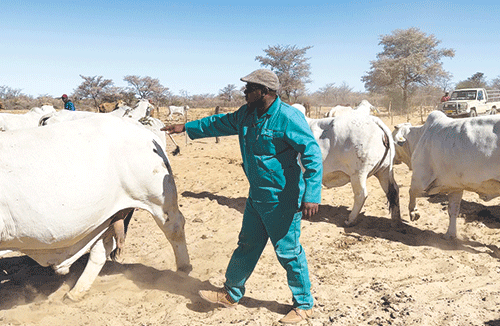An aggressive approach by the land reform ministry has resulted in the allocation of resettlement farms to applicants within two months. This was unheard of in the past, as the process would take up to six months to resettle needy farmers.
The application for farms was advertised in the local print media for resettlement purposes on 31 March 2023 and ran until 2 May 2023.
By 9 June 2023, the farms had new owners. “The ministry intends to accelerate the allocation process to ensure that productivity prevails and theft, vandalism and cost to safeguard such farms are curbed,” stated land reform executive director Ndiyakupi Nghituwamata. The recently resettled cohort has been given 30 days to occupy the farms upon receipt of the original allotment letters.
The allotted farms include farming unit A of Farm Retreat No. 283, farming unit A of Portion 1 (Called Lübeck Oos) of the Farm Lübeck No.2, farming unit C of portion 1 (Called Lübeck Oos) of the Farm Lübeck No.2, all in //Kharas region and farming unit C of Farm Babelsberg No.637 in Kunene region.
Over the years, the ministry has worryingly been irked by the theft of farming equipment including cables which ultimately affect the pumping of water on properties, or the theft of water pumps in general, fencing equipment calling it “a huge damage, running into millions and the consequent hardship is with the communities who are left without water”.
Nghituwamata added that after the closing date, all 14 regional resettlement committees sat within 14 days to discuss the applications of the said farms and make recommendations to the land reform advisory commission.
“Preparation for regional resettlement committees’ meetings and the land reform advisory commission meeting and data capturing commenced immediately after the adverts closed to ensure that there are no delays. All these collective activities were done on time and that sped up the entire process,” she noted.
The approved allotment plans, in respect of the farming units offered for allotment, are available for public inspection during office hours at our offices for 30 days from the date of publication of this notice in the gazette.
All the farms, which are situated in Aranos, Gobabis, Otjiwarongo and Gochas districts are suitable for large and small-stock farming.
New guidelines
Several complaints were brought to the attention of the ministry regarding the late allocation of farms, whether communal or resettlement, with line minister Calle Schlettwein denouncing the claims, saying to address those challenges, the ministry together with traditional authorities, communal land boards and other relevant stakeholders have developed a set of new rules/guidelines to guide the traditional authorities and communal land boards on the best practices applicable to communal land allocation.
“I must state here that I have placed a moratorium on the allocation of communal land for agricultural purposes outside the designated area. The moratorium does not only affect the application from the Kavango West and Kavango East but all regions, apart from the Khomas region which does not have communal land. But it should be noted that contraventions of the provision of the Communal Land Reform Act, 2002 resulting in illegal occupation of communal land will have consequences,” he recently told this publication.
He stated: “Another concern is that communal land is being allocated without taking into account other land uses, more importantly, the approved integrated regional land use plans. We have witnessed communal land rights applications made too close and across water pipes, electricity power lines, servitudes and institutions such as schools, hospitals, and churches. Other land is being allocated in flood plain areas, road reserves, in wildlife corridors, near water canals, hazardous areas and within active Cuvelai drainage system.” He noted that the ministry has witnessed an uncontrolled allocation of communal land where traditional authorities and communal land boards are allocating (huge) different land parcels for different land uses without taking into account the provisions of the Communal Land Reform Act and preservation of the commonage.
Some of the requirements to apply for farms include that an applicant, other than a company or close corporation, must be a Namibian citizen who is 18 years or older; has a background or interest in agriculture or related activities; been socially, economically or educationally disadvantaged by past discriminatory laws or practices; and has relinquished any right in respect of agricultural land.
Underspending
Last month, New Era reported that the department of agriculture and land reform returned at least N$98 million to the State purse.
This money, auditor general Junias Kandjeke said, could have been used to address other pressing public needs.
With N$100 million, the government can buy around 10 farms at the average current going rate. “It was noted that the total budget for the department of agriculture and land reform was underspent with an amount of N$98.3 million (8.04%),” Kandjeke says in the department’s audit report for the 2021/2022 financial year.
The ministry has since responded, saying the execution of its N$1.12 billion was 92%.
“This amount (N$98 million) was mainly meant to cater for the recruitment of critical budgeted positions within the ministry. At the end of the financial year, the ministry only managed to recruit 60% of these positions, mainly due to interviews that could not be held due to Covid-19 restrictions,” it explained in a recent statement.
– psiririka@nepc.com.na


